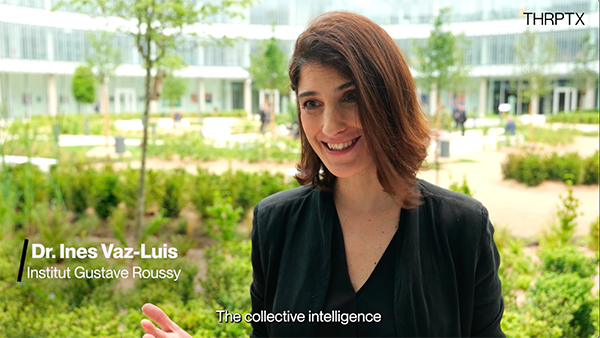“How can science and medical innovation support cancer patients?” This is the question that several experts answered at the THRPTX, the Therapeutics Innovation Summit organized by Servier on June 18, 2024. Look back on this roundtable in images.
Collective intelligence
The participants in this first roundtable highlighted the importance of adopting a holistic and multidisciplinary approach to meet the major challenges with oncology, including a personalized approach to medicine. The development of targeted therapies, the drive to tackle mechanisms of resistance to treatments and the optimum use of breakthrough technological innovations such as AI are paving the way for more personalized medicine.
Pooling resources and expertise across all the stakeholders will make it possible to significantly improve the results of treatments, accelerate their development and increase the accessibility of health care over time.
“The challenges associated with oncology will only be able to be met through a collaborative and multidisciplinary approach. THRPTX illustrates our commitment to open and constructive dialogue with all stakeholders to accelerate the emergence of innovative, accessible and sustainable therapeutic solutions”

Working closely with patients
Each patient is unique, and this obvious statement highlights some of the major challenges with research. During these exchanges, the experts called for patients and patient associations to be involved in the early stages of innovation, from research to therapeutic protocols. Not only is their knowledge of the disease valuable for researchers, but also these “co-creation” dynamics will position them to be actively engaged and help drive research.
Precision medicine, which involves tailoring medical treatments to the characteristics of each patient group, is one factor for ensuring a concrete response for patients. By improving the way differences between individuals are taken into consideration, particularly for clinical trials where certain population categories are still underrepresented, we will be able to develop solutions that are increasingly adapted to individual molecular characteristics.
Lastly, the discussions highlighted the importance of making changes to the criteria for assessing treatments, by taking into account improvements in patients’ living conditions during their treatment for instance.
This roundtable brought together Hans Scheurer, patient and active member of the “Myeloma Patients Europe ” patient association, Doctor Ines Vaz-Luis, Oncologist at the Gustave Roussy center and Professor of Medicine at Harvard Medical School, Professor Andrew Wei, Clinical Hematologist and Researcher with the National Health and Medical Research Council (NHMRC) in Australia, Susan Pandya, Vice President of Clinical Development and Head of the Cancer Metabolism Global Development Division at Servier Pharmaceuticals, and Professor Hsin-an Hou, Hematologist and Professor of Hematology.
The participants were invited in turns to share their vision of how medical innovation can help cancer patients. Their objectives included identifying the challenges facing the pharmaceutical industry and the areas that can be capitalized on to improve patient care.
